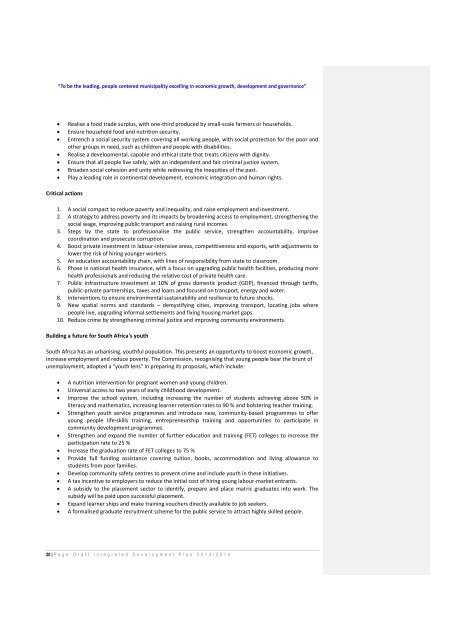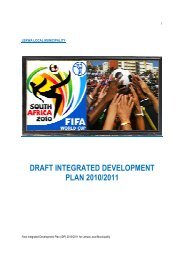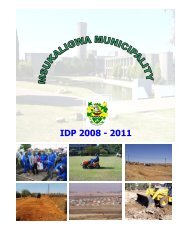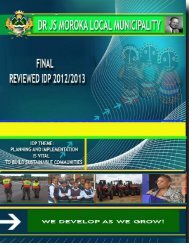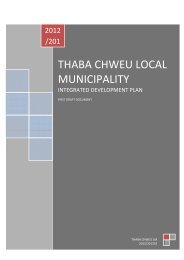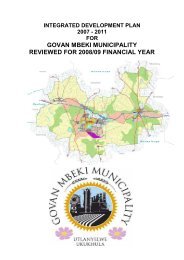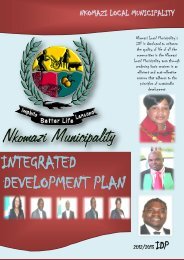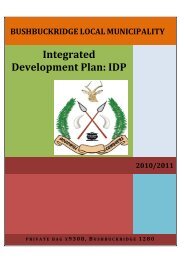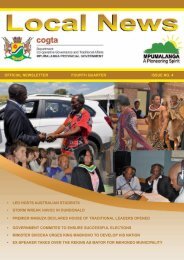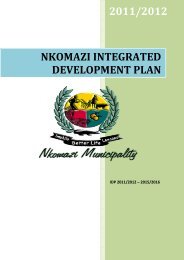Lekwa Local Municipality 2013/14 - Co-operative Governance and ...
Lekwa Local Municipality 2013/14 - Co-operative Governance and ...
Lekwa Local Municipality 2013/14 - Co-operative Governance and ...
You also want an ePaper? Increase the reach of your titles
YUMPU automatically turns print PDFs into web optimized ePapers that Google loves.
“To be the leading, people centered municipality excelling in economic growth, development <strong>and</strong> governance”Realise a food trade surplus, with one-third produced by small-scale farmers or households.Ensure household food <strong>and</strong> nutrition security.Entrench a social security system covering all working people, with social protection for the poor <strong>and</strong>other groups in need, such as children <strong>and</strong> people with disabilities.Realise a developmental, capable <strong>and</strong> ethical state that treats citizens with dignity.Ensure that all people live safely, with an independent <strong>and</strong> fair criminal justice system.Broaden social cohesion <strong>and</strong> unity while redressing the inequities of the past.Play a leading role in continental development, economic integration <strong>and</strong> human rights.Critical actions1. A social compact to reduce poverty <strong>and</strong> inequality, <strong>and</strong> raise employment <strong>and</strong> investment.2. A strategy to address poverty <strong>and</strong> its impacts by broadening access to employment, strengthening thesocial wage, improving public transport <strong>and</strong> raising rural incomes.3. Steps by the state to professionalise the public service, strengthen accountability, improvecoordination <strong>and</strong> prosecute corruption.4. Boost private investment in labour-intensive areas, competitiveness <strong>and</strong> exports, with adjustments tolower the risk of hiring younger workers.5. An education accountability chain, with lines of responsibility from state to classroom.6. Phase in national health insurance, with a focus on upgrading public health facilities, producing morehealth professionals <strong>and</strong> reducing the relative cost of private health care.7. Public infrastructure investment at 10% of gross domestic product (GDP), financed through tariffs,public-private partnerships, taxes <strong>and</strong> loans <strong>and</strong> focused on transport, energy <strong>and</strong> water.8. Interventions to ensure environmental sustainability <strong>and</strong> resilience to future shocks.9. New spatial norms <strong>and</strong> st<strong>and</strong>ards – demystifying cities, improving transport, locating jobs wherepeople live, upgrading informal settlements <strong>and</strong> fixing housing market gaps.10. Reduce crime by strengthening criminal justice <strong>and</strong> improving community environments.Building a future for South Africa's youthSouth Africa has an urbanising, youthful population. This presents an opportunity to boost economic growth,increase employment <strong>and</strong> reduce poverty. The <strong>Co</strong>mmission, recognising that young people bear the brunt ofunemployment, adopted a "youth lens" in preparing its proposals, which include: A nutrition intervention for pregnant women <strong>and</strong> young children. Universal access to two years of early childhood development. Improve the school system, including increasing the number of students achieving above 50% inliteracy <strong>and</strong> mathematics, increasing learner retention rates to 90 % <strong>and</strong> bolstering teacher training. Strengthen youth service programmes <strong>and</strong> introduce new, community-based programmes to offeryoung people life-skills training, entrepreneurship training <strong>and</strong> opportunities to participate incommunity development programmes. Strengthen <strong>and</strong> exp<strong>and</strong> the number of further education <strong>and</strong> training (FET) colleges to increase theparticipation rate to 25 % Increase the graduation rate of FET colleges to 75 % Provide full funding assistance covering tuition, books, accommodation <strong>and</strong> living allowance tostudents from poor families. Develop community safety centres to prevent crime <strong>and</strong> include youth in these initiatives. A tax incentive to employers to reduce the initial cost of hiring young labour-market entrants. A subsidy to the placement sector to identify, prepare <strong>and</strong> place matric graduates into work. Thesubsidy will be paid upon successful placement. Exp<strong>and</strong> learner ships <strong>and</strong> make training vouchers directly available to job seekers. A formalised graduate recruitment scheme for the public service to attract highly skilled people.20 | P a g e - D r a f t i n t e g r a t e d D e v e l o p m e n t P l a n 2 0 1 3 / 2 0 1 4


